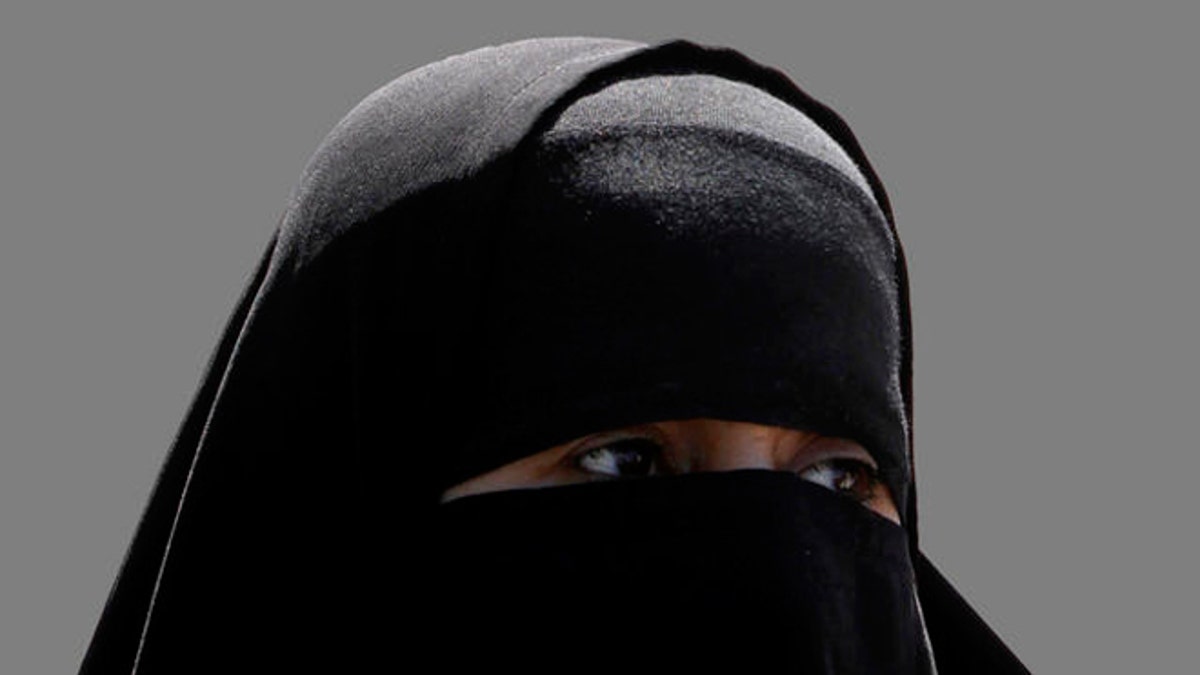
FILE -- A Palestinian woman participates in a solidarity demonstration with prisoners jailed in Israel in Gaza City. (AP)
A reader sent me a story Monday from The New Zealand Herald about a teenage girl who was badly and repeatedly beaten at home -- and who was then forced to disguise her considerable facial injuries, including a broken nose, damaged teeth, and extensive bruising.
I am no fan of the burqa and have even argued that the West should ban it.
Daniel Pipes, director of the Middle East Forum, views the burqa as a security risk—and he is right to do so. Both petty criminals and jihadist terrorists have entered jewelry stores, banks, shopping malls, airports, and railway stations to commit evil deeds and to escape capture in this disguise.
So yes, Pipes is right -- but I also see the burqa as a sensory deprivation isolation chamber, (sensory deprivation is used as a form of torture); a burqa is also an ambulatory body bag and I oppose this with all my mind and heart as a violation of human and women’s rights.
[pullquote]
I believe that the kind of men who expect and demand that women wear burqas in the West today are likely to be radical Islamists; as such, they may be more likely to engage in acts of military jihad here. The Koran absolutely does not mandate the burqa or, for that matter, a face covering of any kind.
Please understand: I am not talking about a head or hair covering which is known as hijab and which is also a custom practiced by many Catholics, Jews, and Sikhs. Wearing a nun’s wimple, a Jewish kippah, a Sikh turban, or an Islamic headscarf does not disguise one’s identity or ability to engage in conversation.
I first encountered the burqa in Kabul, Afghanistan, more than fifty years ago. I was horrified by it then and remain so today. I write about the burqa, both in my new book An American Bride in Kabul and in an academic article in Middle East Quarterly in which I argue that the West should ban the burqa.
According to the New Zealand news report, “members of the [Auckland] Muslim community are alleged to have hushed up the abuse.”
The high profile Shafia honor killing case in Canada was also characterized by a doctrine of “omerta” among family members and by the failure of teachers, social workers, child protection agencies, and a lawyer to recognize that such sustained physical abuse and psychological cruelty often precedes or is correlated with a subsequent honor killing.
In the New Zealand case, the bruised and battered teenager managed to save herself by borrowing a friend’s cellphone to call the police. Another friend, who became alarmed by the burqa-hidden girl’s prolonged absence from school, also called the police.
The police discovered that members of the community in positions of power and trust knew that the abuse was serious but did not help the girl.
“Police believed that family members were also instructed to lie to investigators about the abuse, and did so out of fear for their own safety.”
This girl is now in the “secure care” of another Muslim family.
In my opinion, this teenager will need the equivalent of a federal witness protection program for life -- and she will need to be educated about the risk to herself were she ever to soften when and if she receives a phone call or an in-person visit from her mother.
Muslim girls in the West have been lured to their deaths by mothers who “miss” them and can’t sleep without them, and assure their daughters that “everything will be all right.
Predictably, Javed Khan, acting president of the Federation of the Islamic Associations of New Zealand, insisted that this was “likely a one-off case.” Khan said that community members would “definitely bring it to the attention of the authorities.”
This is not true. Turning another Muslim in to infidel authorities is viewed as shameful and would endanger anyone who does so.
Khan did not denounce the practice of daughter-beating outright. He did not admit that beaten daughters are sometimes also honor killed.
What he said was this: "It has nothing to do with Islam or the religion. It's more to do with a cultural thing ... It could just be the family."
One understands: Immigrants, who have been empowered to feel “angry” about being potentially stereotyped, do not want to risk being seen as criminals -- especially if some members are engaging in acts that a Western country views as a crime.
The problem is this: Muslim-majority countries do not view daughter-beating or forcible veiling as a crime.
Many Muslim immigrants (and increasingly, converts to Islam in our time) behave as if they are living in the past or in a Muslim-majority country and they view Western customs as unacceptable and dishonorable.
We must enforce the laws of our land and make it clear, as Canada and several European countries have tried to do, that we do not believe in “cultural relativism,” that there is one law for all.




















